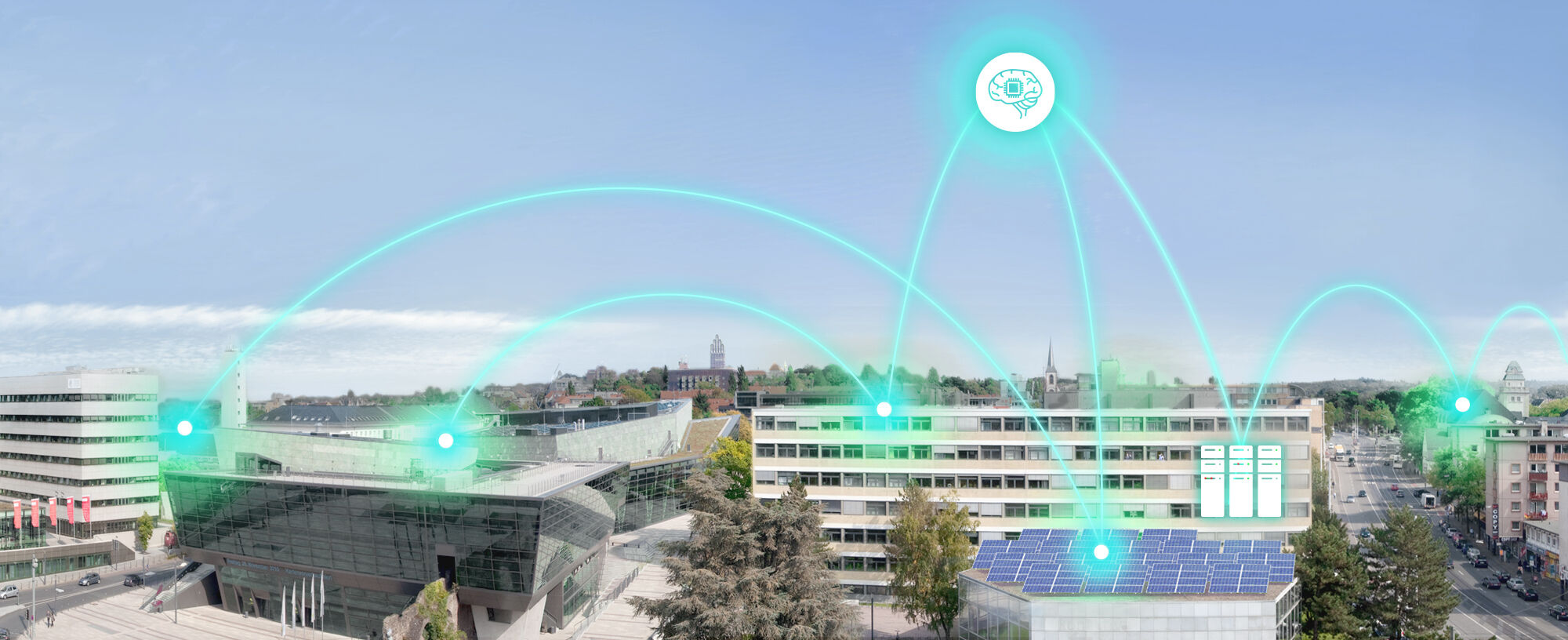Student: Florian Schopp
Supervisor: Johannes Börner
Time period: 04/16/2018 - 07/16/2018
Type: Bachelor Thesis
Im Rahmen der Arbeit wird ein Modell- VSI aufgebaut und vermessen.
Student: Jonas Hülsmann
Supervisor: Christopher Ripp
Time period: 06/01/2018 - 11/30/2018
Type: Master Thesis
Today, some rules of the german control power market prevent the participation of small scale power units or make it at least economically unattractive (see prequalification requirements). Small scale units are typically up to a size of a few kW. However, if many of such units are pooled,they could act as one reliable partner to the contracting transmission system operator (TSO). This theoretical idea has not been formulated in detail so far. The task of this thesis is the development of a concept for this coupling of small scale units under consideration of the uncertanties of availabilty of each unit.
Student: Mario Beykirch
Supervisor: Tim Janke
Time period: 10/16/2017 - 04/16/2018
Type: Master Thesis
In order to improve the quality of energy system simulation and optimization it is of crucial to work with realistic models for the individual production units. Using the entsoe data and the literature, this thesis' goal is to estimate the private dispatch parameters of thermic powerplants for an assumed dispatch model. Following a baysian approach, a posterior distribution for each parameter should be estimated.
Student: Robin Köster
Supervisor: Tim Janke
Time period: 08/01/2018 - 10/31/2018
Type: Project Seminars Bachelor
Generative Adversarial Networks (GAN) are among the most discussed topics in machine learning right now. Instead of minimizing an explicit loss function, a generative model, the generator, is trained to “fool” another model, the discriminator, by generating realistic samples from a random input vector. On the other hand, the discriminator is trained to distinguish fake samples created by the generator from real samples. Building on this, Conditional GANs generate samples conditionally on an input vector and therefore can be used to make predictions, e.g. on video frames (Lottner, Kreiman, Cox, 2015). This thesis aims to explore the possibilities GANs and C-GANs offer to scenario generation and forecasting for electricity markets, especially intraday trading.
Student: Bastian Brindley
Supervisor: Tim Janke
Time period: 10/31/2017 - 01/31/2018
Type: Master Thesis
Campus energy management systems jointly operate the multi-modal energy consumption and generation of a building complex, improving its overall cost position and its environmental impact. There is growing interest in such systems as increasing decentral, mostly renewable generation and more and more actively controllable loads such as e-car charging stations imply drastically improved opportunities. Additionally, future energy systems with a high faction of volatile renewable energy rely on the intelligent and flexible behavior of prosumers. The Master’s thesis will examine how such a system can interact with energy markets today and in the future. The Honda Campus in Offenbach will serve as an exemplary use case.
Student: Philipp Ganss
Supervisor: Florian Steinke
Time period: 01/01/2018 - 07/01/2018
Type: Master Thesis
Im Rahmen dieser Studienarbeit wird eine Prognose des Ausbaus von PV- und Windenergieanlagen in Deutschland aufgrund der bisherigen und kommenden Ausschreibungsrunden bis 2021 vorgenommen. Ausgehend von diesem Bild werden zwei Szenarien (lastnah, lastfern) eines zukünftigen Ausbaus bis 2025 entwickelt und unter Berücksichtigung von:
• Transportkosten von Erzeuger zu Verbraucher
• Effizienz der staatlichen Subventionen in Euro/kWh
bewertet. Ziel ist es ein Bild der momentanen Entwicklung zu geben und fortzuführen und anhand von verschiedenen Diskussionspunkten zu bewerten:"Führt uns das momentane Förderungsprogramm in eine wünschenswerte Richtung und was könnte getan werden um dieses weiter zu optimieren"
Student: Florian Schopp
Supervisor: Johannes Börner
Time period: 02/05/2018 - 05/05/2018
Type: Bachelor Thesis
Aim of the project is to implement the model a PV energy source as an VSI. Volatge source inverters are often used as the model to implement distributed energy reesources in micro grids. As a pre-study for larger and more general work a PV source willl be modelled and its feed into an electrical network studied.
Student: Jens Haberzettl
Supervisor: Tim Janke
Time period: 06/18/2018 - 12/17/2018
Type: Master Thesis
Wholesale spot market prices play the key role for the effective and efficient generation from renewable energy sources (RES), the thermal generation, and the flexible share of the demand. The rising share of generation from RES increases the volatility and uncertainty of future market prices and operators of generation units and flexibilities face an increasingly complex stochastic optimization problem with the price as a main source of uncertainty. Consequently, the paradigm in electricity price forecasting (EPF) shifted from point to probabilistic forecasting techniques in recent years. This thesis aims to critically review the current literature on probabilistic forecasting models and their evaluation metrics from a theoretical point of view. Furthermore, it should practically implement and test benchmark models for the probabilistic forecasting of the German day-ahead spot market prices as well as test new methods, e.g. from the machine learning literature.
Student: Philip Buß
Supervisor: Johannes Börner
Time period: 06/18/2018 - 09/18/2018
Type: Bachelor Thesis
Im Rahmen der Arbeit soll eine zentrale Sekundärregleung in Simulink implementiert und anschließend auf das Testsystem des EINS Controller Lab portiert werden.
Student: Anisch Bawer
Supervisor: Johannes Börner
Time period: 02/05/2018 - 08/05/2018
Type: Master Thesis
The thesis aims to establish Virtual Controller Functions in a Software Defined Network.
Characteristic for SDN is their seperation of the network data and controller plane. During the thesis a virtual SDN will be established and algorithm for a continous communication routing will be tested.
Virtual Controller Functions will extend the idea of Virtual Network Functions from communication systems to caber physical systems. VNC fulfill tasks in a network in a distributed manner inside a virtual machine and are placed according to the network's needs. VCF will also function inside distributed virtual machines but also take into account control theoretic preferences and needs of the underlying physcal system.



